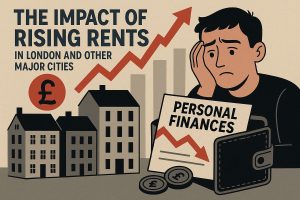In 2016, after years of careful planning, Martin Lewis established the Money and Mental Health Policy Institute. This organization’s mission is to conduct research, advocate for policy changes, and provide support for those grappling with mental health issues and financial debt.
By offering practical tools and strategies, it aims to empower individuals to manage their finances even during challenging times. This initiative seeks to provide a lifeline to those who need structured support and guidance to regain financial stability.
Proactive Financial Control

One innovative approach the institute explores is equipping individuals with tools while they are mentally well, enabling them to control their finances when they are not. For instance, implementing a system where individuals can freeze their credit files for eight weeks can prevent impulsive spending sprees, which are common in conditions like clinical depression and bipolar disorder.
The Intersection of Debt and Mental Health
Debt and mental health issues often create a vicious cycle, where one exacerbates the other. Martin Lewis, through his work, emphasizes that severe debt can lead to the breakdown of relationships, loss of homes, and destabilization of families. His message is clear: mental health problems can cause severe debt, and severe debt can, in turn, exacerbate mental health problems.
Practical Solutions and Support
Addressing this dual crisis requires practical solutions. Martin recounts a pivotal moment when a mental health caseworker thanked him for his MoneySavingExpert.com website. The caseworker used the site to help clients manage their debt issues, highlighting the profound impact of providing accessible financial guidance. This encounter underscored the need for resources tailored to those who struggle to manage their finances due to mental health conditions.
The Role of Responsible Borrowing
Martin advocates for responsible borrowing, noting that while lenders are primarily focused on selling debt, borrowers must take charge of their financial health. However, this responsibility is not always feasible for individuals facing mental health challenges.
The easy credit era has created potential disaster scenarios, and it’s crucial to find a balance between restricting credit access and enabling rational borrowing for necessary expenses like mortgages and student loans.
Comprehensive Debt Management Guide
The guide created by the institute is not just for those experiencing mental health issues but also for their friends, families, and carers. It offers step-by-step advice, practical tips, and real-life case studies from the MoneySavingExpert.com community. The aim is to provide hope and practical strategies for overcoming debt, with color-coded sections to help readers navigate based on their emotional state.
Accessible Help and Resources
For those in severe debt crisis, free personal debt counseling is invaluable. The guide includes contact information for non-profit organizations and free online tools to help manage debts. It emphasizes the importance of seeking help early and provides practical steps for dealing with emergency situations.
Collaborating with Financial Institutions
Working with banks can be daunting for individuals with mental health issues. However, once a lender is aware of a customer’s condition, they are obligated to make reasonable adjustments. This section of the guide outlines rights, protections, and tips from mental health charities on whether and how to disclose a mental health condition to financial institutions.
Therapeutic Approaches to Financial Stress
Managing finances can seem overwhelming, especially when dealing with mental distress. This section of the guide offers therapeutic approaches and tips from experts and those with lived experience. These strategies aim to help individuals begin their recovery by taking small, manageable steps towards financial stability.
Support from Loved Ones
Friends, family, and carers play a crucial role in supporting individuals with mental health and debt issues. The guide offers advice on how to assist loved ones, from setting up joint bank accounts to understanding carers’ benefits and discounts. It emphasizes the importance of a supportive network in helping individuals navigate their path to financial freedom.
The Path Forward
No debt problem is unsolvable. Despite the challenges, there is always light at the end of the tunnel. This guide is about recognizing the intertwined nature of mental health and debt and providing practical steps to help individuals regain control. By addressing both issues simultaneously, it aims to break the cycle and empower people to build a better financial future.
A Brighter Future Awaits
Breaking free from the chains of debt and mental health struggles is challenging but achievable. With the right tools, support, and determination, individuals can overcome these obstacles and create a stable, healthy financial life. The Money and Mental Health Policy Institute is dedicated to guiding and supporting those on this journey, offering hope and practical solutions every step of the way.





